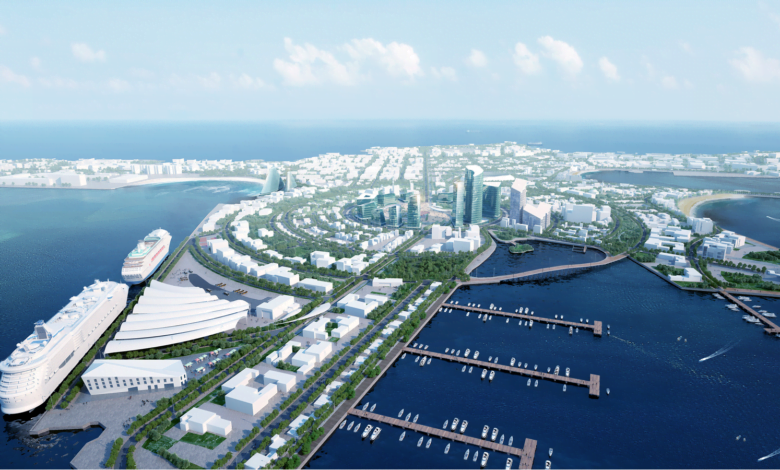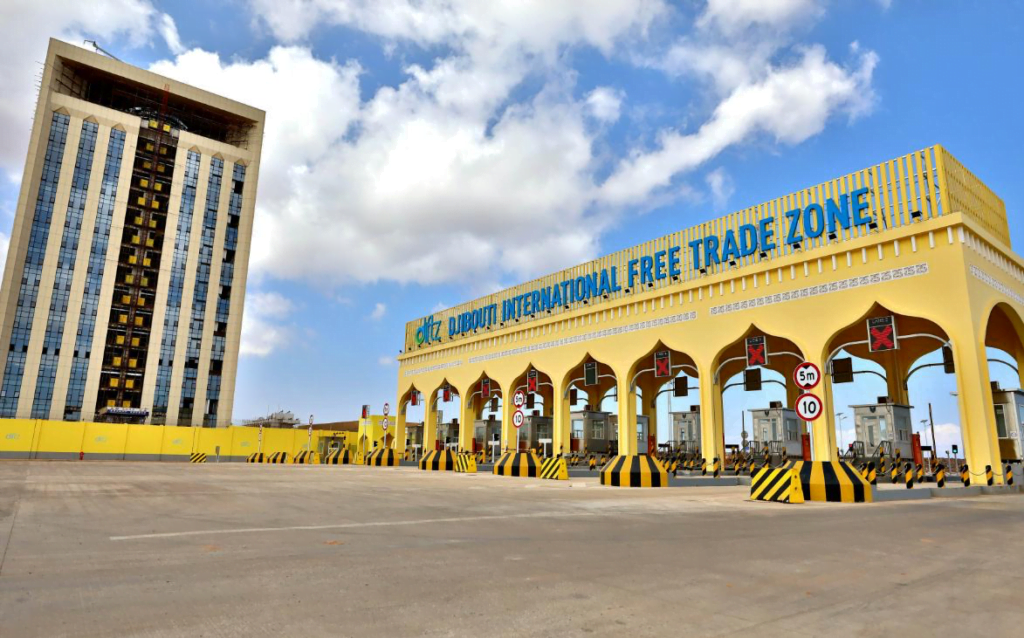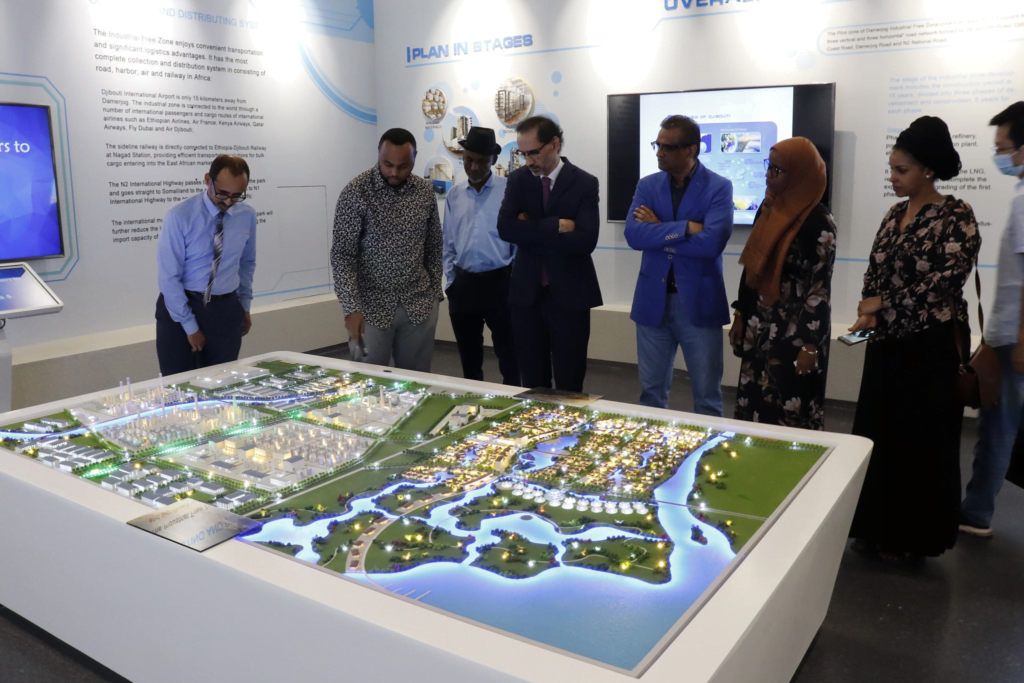World maritime trade crossroads
Over the past two decades, Djibouti has invested heavily in building new ports and upgrading existing infrastructure. With the implementation of the Djibouti Free Trade Zone (DIFTZ) and other ongoing projects, the country has established itself as the trade and logistics hub for the Horn of Africa. And it intends to stay that way.

A liquefied natural gas terminal, a business park, ship repair yards, an oil terminal, an international airport, new railway lines linking the capital Djibouti to the main regional trade routes… While the COVID-19 pandemic and the war in Ukraine have disrupted trade and supply chains, this has not slowed Djibouti’s ambitions. On the contrary, the country has seen this as an opportunity to confirm its position as a trade and logistics hub and to accelerate its strategy of modernizing its port infrastructure around the free trade zones.
Situated at the entrance to the Bab-el-Mandeb Strait, Djibouti and its ports, with nearly 2,500 vessels, six operational terminals and a cross-border rail network, acts as a regional hub. Its economy is largely based on providing maritime services to neighboring Ethiopia and Somalia. But it now has new ambitions, with a new free trade zone set to open in 2018 and become the largest in Africa.
An industrial zone for East and Central Africa

Thanks to the support of the African Export-Import Bank (Afreximbank), which provided Djibouti’s Great Horn Investment Holding (GHIH) with a $120 million loan for a series of projects in the Damerjog Industrial Development Free Zone, the Djibouti Ports Authority announced last July that it was building infrastructure to boost commercial activities. This includes the Damerjog Oil Jetty, which will provide a maritime link to the free zone.
« In line with our multi-year investment strategy to make our country a logistics and trade hub for the sub-region, we are responding to this growing demand by providing the necessary infrastructure, » explains Aboubaker Hadi Omar, chairman of the Djibouti Ports and Free Zones Authority (DPFZA) and Great Horn Investment Holding (GHIH) since 2011. This public investment fund, which is responsible for logistics and transport facilities, manages all the country’s infrastructure, from ports to road and rail corridors, and will soon manage the cargo airport. Within this framework, the offshore jetty and storage tank project in the Damerjog Industrial Zone aims to « support and improve the movement of petroleum products in the region, while developing an economic belt with Ethiopia and ultimately an industrial zone for East and Central Africa. »
Djibouti is already one of the three continental port hubs for container traffic
Taking advantage of its geographical location and following the strategy set out in its « Vision 2035 » development plan, Djibouti, a historic crossroads between Africa, Europe, Asia and the Middle East, has invested in recent years in modernizing its port infrastructure and diversifying its range of services to strengthen its position. With developments such as the inauguration of the first mixed logistics zone in the Ethiopian city of Dire Dawa, Djibouti is confirming its « indispensable character, » says Aboubaker Omar Hadi.
Inaugurated in July 2018 in the presence of Ethiopian Prime Minister Abiy Ahmed, Rwandan President Paul Kagame and then Sudanese President Omar al-Bashir, Djibouti’s new free zone, connected to the country’s main ports, is set to become the largest free zone on the African continent. The first phase of the project will begin with the construction of a 240-hectare zone, increasing to 4,800 hectares within ten years. The total budget for the operation is $3.5 billion. At the end of the project, Djibouti’s free zone will be the largest on the continent. Foreign companies are expected to set up processing units to add value to imported and exported products. « The volume of products arriving in East Africa is increasing all the time. Every time a product leaves the continent without being processed, it’s a lost opportunity for Africa, » says Aboubaker Omar Hadi.
According to the Djibouti authorities, the pilot phase will have an economic impact of $200 million, or 11% of GDP, on the free zone’s turnover, with around twenty companies expected to join the zone once it opens. The ramp-up to 2035 and 2040 and the expansion of the zone are expected to generate between $2.5 and $4 billion.
Port, Park and City

This major initiative in the era of the AfCFTA (African Continental Free Trade Area) to promote intra-African trade has benefited in particular from the support of China, Djibouti’s main partner. However, the Djibouti government remains the majority shareholder in the free trade zone, alongside three Chinese groups: China Merchants Group, Dalian Port Corporation and IZP Technologies.
In the year following its inauguration in 2019, DIFTZ was ranked as one of the best free zones and received numerous awards in the Global Free Zone Ranking of the Year, awarded by fDi Intelligence, a subsidiary of the Financial Times. With more than 300 companies currently operating there, the zone is part of an ambitious global strategy. A key element of this roadmap is the development of Djibouti’s old port. This will be completely transformed to accommodate a new international business district as an extension of the port infrastructure and free zones under the triptych: Port, Park and City (PPC).
Meanwhile, Ethiopian Airlines, Africa’s leading air cargo carrier, announced in March that it was joining forces with Air Djibouti and Djibouti Industrial Park Operation (IDIPO) to launch a multimodal sea-air transport service. Under the agreement, cargo will be transported by sea from China to Djibouti’s free trade zone and then flown from Djibouti International Airport. This project, which is expected to divert some cargo from Dubai, confirms the ambitions of the Ethiopian-Djiboutian duo to make the region the cargo hub of Africa.





